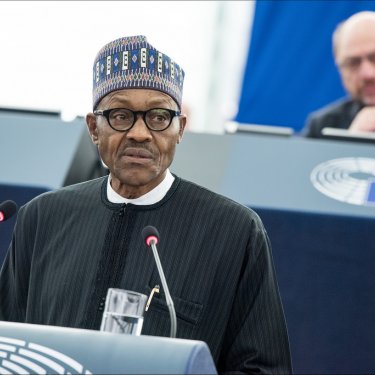Nigerian reporters under yoke of all-powerful governors

Reporters Without Borders (RSF) is appalled by all the violence against journalists in Nigeria in the past 18 months and reminds President Muhammadu Buhari’s federal government of its obligations as regards media freedom, including the obligation to ensure that state governors respect it.
Since the start of 2016, RSF has registered more than 70 cases of violence against journalists and media outlets in the course of their work in Nigeria. Last week’s demolition of Breeze FM in Abuja, the federal capital, is just one example of the climate of violence and instability to which journalists are exposed.
The station, which began broadcasting last February, was torn down in a single day, 20 May, on the grounds that it had been issued a permit to operate in a residential area by mistake. Journalists were unable to cover its demolition because the police shot in the air to disperse protesters.
“Due process was not followed”, Breeze FM director Nawani Aboki told the Daily Trust. “This demolition was carried out because I don’t belong to the same political party as the governor. He is afraid that the station might not support his political ambition. Part of the reasons is that the station aired a report on the ongoing labour strike in the state.”
The station broadcasted a debate on 1 May in which guests criticized the delay in paying salaries to employees of the state government in Nasarawa, the state immediately to the east of Abuja.
“The summary methods used to silence this radio station are unacceptable and are part of a generalized climate of violence towards the media in Nigeria,” RSF editor in chief Virginie Dangles said. “We call on President Muhammadu Buhari to follow through on his statements of support for the media by reining in the state governors and state governments responsible for this kind of violation.”
This was not Nasarawa governor Umaru Al-Makura’s first attack on the media. Several journalists have been targeted. Punch newspapers correspondent Umar Muhammed and Rabiu Omaku of the Universal Reporters news website were ejected from Nasarawa’s government house last September and were forbidden to return because of articles critical of the governor. In November, they were banned from covering Nasarawa government activities “for life.”
All-powerful governors
Such arbitrary actions are unfortunately typical of what journalists experience in Nigeria. The wide-ranging autonomy and political weight of governors in their own state guarantee them almost complete impunity in their treatment of the local media, hence the profusion of more or less official measure designed to silence critics.
The states that are the leading media freedom violators are the Federal Capital Territory (Abuja) in the centre of the country (with 16 cases since the start of 2016), Lagos in the southwest (9), Bayelsa in the south (4), and Rivers in the southeast (4). Cases of violence against journalists and violations of the freedom to inform were registered in 24 of Nigeria’s 38 states.
Bans on access to public information are the leading category of media freedom violation although Nigeria adopted a Freedom of Information Act with great fanfare in 2011.
Since the start of 2016, at least 39 journalists have been arbitrarily prevented from doing their work because they were denied access to a trial, press conference, senate debate or other activity that they were nonetheless accredited to cover.
Just weeks ago, on 7 May, Abuja presidential palace correspondents were turned away when President Buhari received the 82 Chibok schoolgirls who had just been released by Boko Haram. The only media allowed to cover the event were state media such as Nigeria Television Authority and Voice of Nigeria (VON), whose bosses are appointed by the federal government.
A climate of impunity...
Regardless of the federal government’s obligations, journalists are often targeted by the police, army or State Security Service (SSS), and usually with complete impunity. Journalists often pay a high price for catching them in the act of corruption or using violence against civilians.
Channels Television cameraman Ekikere Udom was badly beaten by police in Port Harcourt last November as he was filming them firing on members of the two main parties – the People’s Democratic Party and All Progressives Congress – who were protesting in the street. His phone and other personal items were seized and he had to be treated in hospital.
In all, more than 10 journalists have been the victims of violence by the security forces since the start of 2016.
Arbitrary arrests of journalists are also frequent. In Lagos State, for example, police arrested ten Biafra Times journalists on sedition charges on 30 January, seizing equipment and copies of the newspaper. They were accused of supporting the Biafran separatist cause, which is regarded by the government as a terrorist movement and is virtually a taboo subject in Nigeria.
In February, soldiers in the southeastern State of Abia seized copies of four newspapers – New Republic, Vesym, Freedom Journal and Authority – with stories about Biafran separatism and attacked the newspapers’ vendors.
According to RSF’s tally, at least 23 journalists have been arrested since the start of 2016. In most cases, they were quickly released and charges were dropped. RSF condemns this method of harassing and intimidating media personnel in Nigeria.
...that is spreading
Acts of violence by the authorities against journalists enjoy complete impunity, which encourages more violence of the same kind. At least 11 journalists have been injured by civilians, and their equipment has been damaged, during violent incidents. In most cases, they were attacked while covering protests. Investigations were sometimes launched but without any result.
At least three broadcast media outlets have also been invaded by groups of youths trying to force them to broadcast certain content.
Nigeria is ranked 122nd out of 180 countries in RSF’s 2017 World Press Freedom Index after falling six places in a year.



